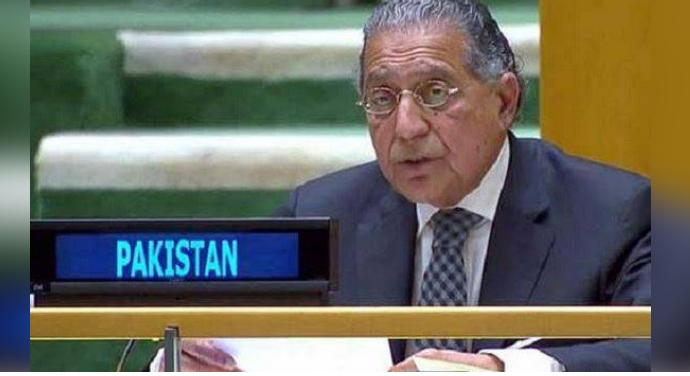New York (Web Desk/Agencies): Pakistan’s Permanent Representative to the United Nations (UN) Ambassador Munir Akram addressed the UN Security Council (UNSC) on Monday, stressing the growing threat posed by the Tehreek-e-Taliban Pakistan (TTP) to Afghanistan’s neighbouring countries.
The Pakistani envoy highlighted that the TTP, which boasts a force of approximately 6,000 fighters, is not only carrying out cross-border attacks on Pakistan but is also receiving support from external sources.
"The TTP also receives external support and financing from our principal adversary," he said, referring to India.
Akram warned that the TTP is collaborating with other terrorist groups that are actively trying to destabilize Pakistan, particularly by targeting its economic initiatives with China, such as the China-Pakistan Economic Corridor (CPEC).
Akram also accused the Taliban government of being complicit in the TTP’s activities, suggesting that the Taliban’s patronage of the group is exacerbating the security situation.
He noted that the TTP is increasingly functioning as an umbrella organization for a range of terrorist factions.
"The greatest threat to security and stability in Afghanistan – and the entire region, and indeed the world – arises from the over 20 terrorist organizations present in Afghanistan," he said.
Furthermore, Akram pointed out that the Taliban government has struggled to deal with challenges from other extremist groups, particularly Daesh (ISIL-K), which has claimed responsibility for numerous attacks not only within Afghanistan but also across the region, including in Iran, Russia, and Pakistan.
The Pakistani envoy also provided examples of Pakistan’s proactive efforts in countering terrorism.
"Pakistan successfully foiled attempts by ISIL-K terrorists to cross over from Afghanistan into Pakistan," Akram said, underscoring the country's commitment to preventing terrorist groups from establishing operations on its soil.
He cited the detention of key ISIL-K operatives, including an individual, Muhammad Sharifullah, who was allegedly involved in plotting the Abbey Gate bombing during the US evacuation from Afghanistan in 2021.
In his address, Akram also underscored that while Pakistan has taken measures to combat groups like Daesh, the Taliban has failed to address the growing threat posed by other terrorist factions, including Al-Qaeda, the TTP, and separatist groups such as the Balochistan Liberation Army (BLA).
On the subject of human rights, Akram criticized the Taliban's regressive policies, particularly towards women and girls.
"Instead of fulfilling its earlier commitments, the Kabul government has doubled down on its restrictions against women and girls," he stated, emphasizing that these actions contradict both international norms and the teachings of Islam, as articulated in the Islamabad Declaration on Girls’ Education in Muslim Communities, hosted by Pakistan.
In closing, Ambassador Akram reiterated Pakistan's firm position on regional security and the importance of cooperation between Afghanistan and its neighbours.
"The people of Pakistan are deeply sensitive to the suffering of their Afghan brothers and sisters," he said, adding that Pakistan remains "steadfast in our commitment to support all possible efforts at the bilateral, regional and global level to achieve peace, stability and development in Afghanistan.
"He concluded with a call for the international community to continue its support, stating that after four decades of conflict, the Afghan people "deserve no less."


